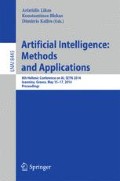Abstract
The modality ‘true in many cases’ is used to handle non-classical patterns of reasoning, like ‘probably φ is the case’ or ‘normally φ holds’. It is of interest in Knowledge Representation as it has found interesting applications in Epistemic Logic, ‘Typicality’ logics, and it also provides a foundation for defining ‘normality’ conditionals in Non-Monotonic Reasoning. In this paper we contribute to the study of this modality, providing results on the ‘majority logic’ Θ of V. Jauregui. The logic Θ captures a simple notion of ‘a large number of cases’, which has been independently introduced by K. Schlechta and appeared implicitly in earlier attempts to axiomatize the modality ‘probably φ’. We provide a tableaux proof procedure for the logic Θ and prove its soundness and completeness with respect to the class of neighborhood semantics modelling ‘large’ sets of alternative situations. The tableaux-based decision procedure allows us to prove that the satisfiability problem for Θ is NP-complete. We discuss a more natural notion of ‘large’ sets which accurately captures ‘clear majority’ and we prove that it can be also used, at the high cost however of destroying the finite model property for the resulting logic. Then, we show how to extend our results in the logic of complete majority spaces, suited for applications where either a proposition or its negation (but not both) are to be considered ‘true in many cases’, a notion useful in epistemic logic.
Access this chapter
Tax calculation will be finalised at checkout
Purchases are for personal use only
Preview
Unable to display preview. Download preview PDF.
References
Askounis, D., Koutras, C.D., Zikos, Y.: Knowledge means ‘All’, belief means ‘Most’. In: del Cerro, et al. (eds.) [6], pp. 41–53
Blackburn, P., de Rijke, M., Venema, Y.: Modal Logic. Cambridge Tracts in Theoretical Computer Science, vol. 53. Cambridge University Press (2001)
Boutilier, C.: Conditional logics of normality: A modal approach. Artificial Intelligence 68(1), 87–154 (1994)
Burgess, J.P.: Probability logic. J. Symb. Log. 34(2), 264–274 (1969)
Chellas, B.F.: Modal Logic, An Introduction. Cambridge University Press (1980)
del Cerro, L.F., Herzig, A., Mengin, J. (eds.): JELIA 2012. LNCS, vol. 7519. Springer, Heidelberg (2012)
Dubois, D., Welty, C.A., Williams, M.-A.(eds.): Principles of Knowledge Representation and Reasoning: Proceedings of the Ninth International Conference (KR 2004), Whistler, Canada, June 2-5. AAAI Press (2004)
Fitting, M., Mendelsohn, R.L.: First-Order Modal Logic. Synthése Library, vol. 277. Kluwer Academic Publishers (1998)
Fitting, M.C.: Proof Methods for Modal and Intuitionistic Logics. D. Reidel Publishing Co., Dordrecht (1983)
Goldblatt, R.: Logics of Time and Computation, 2nd edn. CSLI Lecture Notes, vol. 7. Center for the Study of Language and Information. Stanford University (1992)
Herzig, A.: Modal probability, belief, and actions. Fundam. Inform. 57(2-4), 323–344 (2003)
Hughes, G.E., Cresswell, M.J.: A New Introduction to Modal Logic. Routledge (1996)
Jauregui, V.: The ‘Majority’ and ‘by Default’ Modalities. In: Orgun, Thornton (eds.) [16], pp. 263–272
Jauregui, V.: Modalities, Conditionals and Nonmonotonic Reasoning. PhD thesis, Department of Computer Science and Engineering, University of New South Wales (2008)
Koutras, C.D., Moyzes, C., Zikos, Y.: A modal logic of Knowledge, Belief and Estimation. Technical Report (2013), http://users.uop.gr/~ckoutras/KMZ-KBE-Full.pdf
Orgun, M.A., Thornton, J. (eds.): AI 2007. LNCS (LNAI), vol. 4830. Springer, Heidelberg (2007)
Pacuit, E.: Neighborhood semantics for modal logic: An introduction. Course Notes for ESSLLI 2007 (2007)
Pacuit, E., Salame, S.: Majority logic. In: Dubois, et al. (eds.) [7], pp. 598–605
Salame, S.: Majority Logic and Majority Spaces in contrast with Ultrafilters. PhD thesis, Graduate Center, City University of New York (2006)
Schlechta, K.: Filters and partial orders. Logic Journal of the IGPL 5(5), 753–772 (1997)
Segerberg, K.: An essay in Clasical Modal Logic. Filosofiska Studies, Uppsala (1971)
van der Hoek, W.: On the semantics of graded modalities. Journal of Applied Non-Classical Logics 2(1) (1992)
Vardi, M.: On the complexity of epistemic reasoning. In: Proceedings of the Fourth Annual Symposium on Logic in Computer Science, pp. 243–252. IEEE Press, Piscataway (1989)
Zikos, Y.: Modal Epistemic Logics without Negative Introspection: Epistemic structures and extensions with estimation and information. PhD thesis, Graduate Programme in Logic, Algorithms & Computation (MPLA), Dept. of Mathematics, University of Athens. In: Greek (2012)
Author information
Authors and Affiliations
Editor information
Editors and Affiliations
Rights and permissions
Copyright information
© 2014 Springer International Publishing Switzerland
About this paper
Cite this paper
Koutras, C.D., Moyzes, C., Nomikos, C., Zikos, Y. (2014). On the ‘in many cases’ Modality: Tableaux, Decidability, Complexity, Variants. In: Likas, A., Blekas, K., Kalles, D. (eds) Artificial Intelligence: Methods and Applications. SETN 2014. Lecture Notes in Computer Science(), vol 8445. Springer, Cham. https://doi.org/10.1007/978-3-319-07064-3_17
Download citation
DOI: https://doi.org/10.1007/978-3-319-07064-3_17
Publisher Name: Springer, Cham
Print ISBN: 978-3-319-07063-6
Online ISBN: 978-3-319-07064-3
eBook Packages: Computer ScienceComputer Science (R0)

